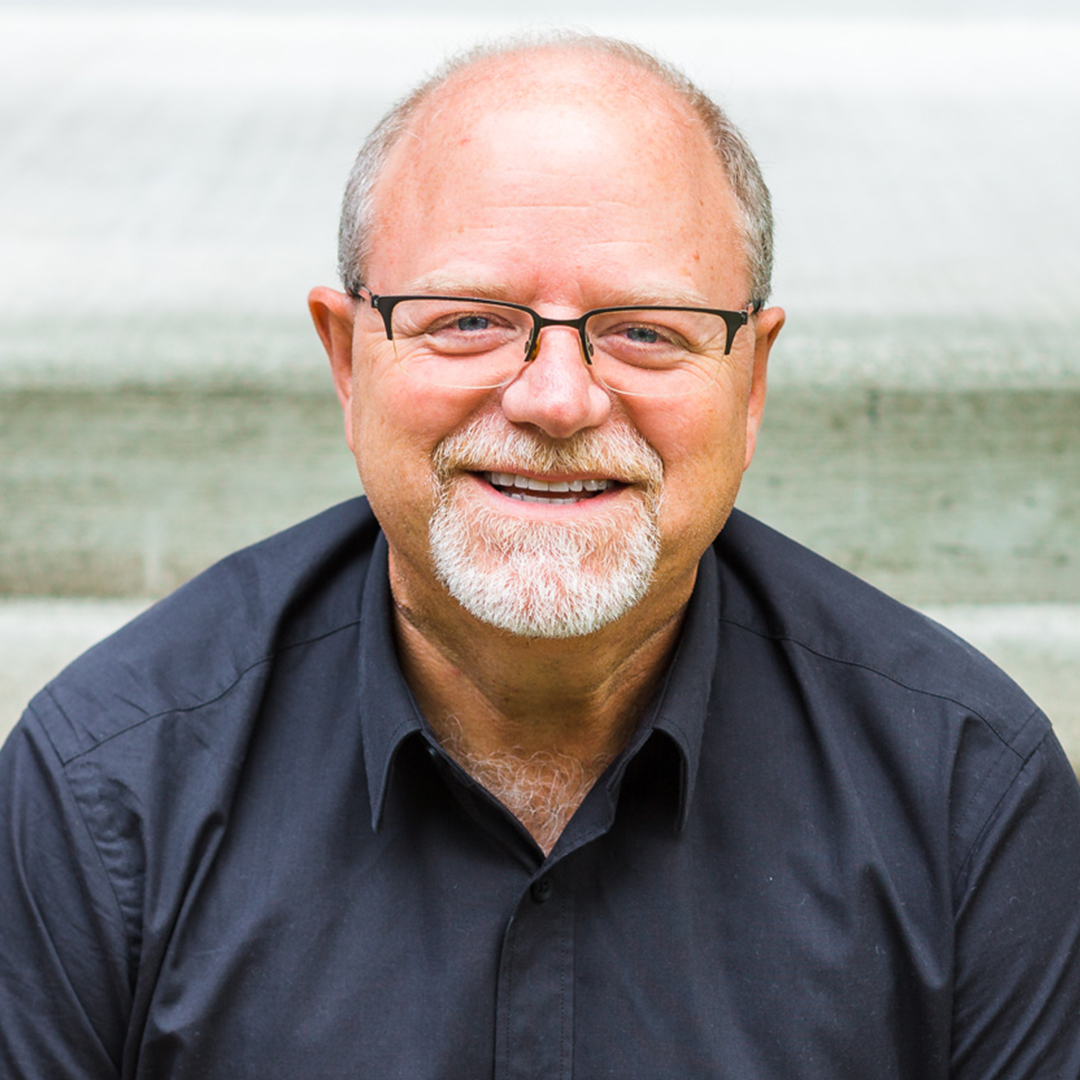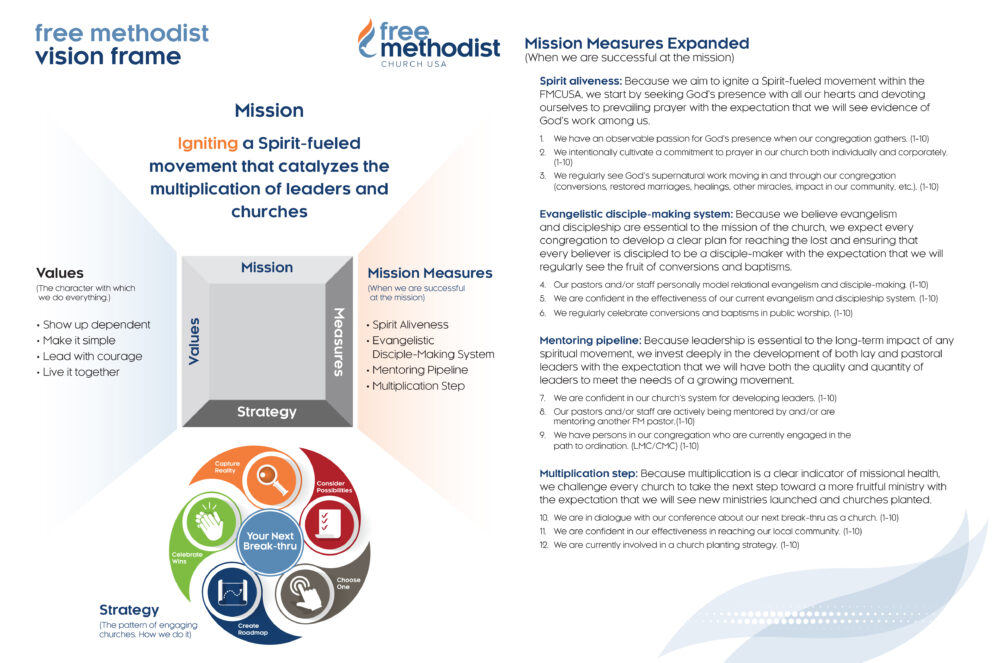
Bishop Keith Cowart
Bishop Keith Cowart, D.Min., oversees Free Methodist ministries along the Eastern Seaboard, in the South Central United States and also in Europe and the Middle East. He was elected a bishop of the Free Methodist Church USA at General Conference 2019. He previously served as the superintendent of the Southeast Region after 21 years as the founding lead pastor of Christ Community Church in Columbus, Georgia. This article is based on a message he shared June 3 during the opening service of the New South/Wabash Annual Conference.
By Bishop Keith Cowart
As we come out of COVID and everything else we’ve experienced over the past couple of years, I am sensing a yearning to see God do something that only God can do in our lives and in our churches. One thing we’ve gotten out of this season is that we don’t want to play church games anymore. We want to be part of a genuine move of God’s Spirit.
Bishop Matt Whitehead, Bishop Linda Adams and I spent the better part of two years praying and asking the Lord to give us clarity around where we need to be focused. The result is a new Vision Frame that guides all of us who work on behalf of the denomination. It’s not meant to replace the local church’s unique mission or vision, but is meant to shape everything we do as denominational leaders. The Vision Frame’s mission statement is “igniting a Spirit-fueled movement that catalyzes the multiplication of leaders and churches.”

We don’t want to be an institution. We began as a movement. We want to be a movement again, but it will not happen on the basis of our own wisdom, strength or resources. It must be a genuine work of the Holy Spirit in and through our churches.
My son Andrew called me several months ago while finishing a master’s degree program in Christian leadership and spiritual formation. For one of his final papers, he needed to ask a leader: “What is the relationship between self-leadership and the leadership of others?”
“We cannot lead others to a place we’ve not yet gone ourselves,” I replied.
We can talk about it. We can even cast vision for it. But if we’re not ready to go there ourselves, we will lack the integrity and spiritual authority to lead with maximum impact.
I was thinking about that conversation in light of our mission to ignite a Spirit-fueled movement. It is a bold statement. Some would say it is overly ambitious; others simply would say “good luck.”
I don’t want to be an idealist, and I pray I never become a cynic. But here’s what I know: The best thing I can do as a leader in the Free Methodist Church is to allow God to ignite a Spirit-fueled movement in me. I invite you to consider that proposition in your own life.
A Lifelong Journey
When we’re talking about the Holy Spirit, we have to be careful not to make our own personal experience normative for everyone else. At the same time, it probably is important for you to know something of the context out of which this message comes, so I want to share a bit of my own story in relation to the Holy Spirit.
I was raised in a small United Methodist Church in South Georgia. During my teen years in the late 1970s, the charismatic movement came flooding into our little United Methodist Church, and it turned everything upside down. I began to hear things about the Holy Spirit that I’d never heard before. I saw a dramatic change in the lives of those who testified to a new experience of the Holy Spirit. I saw new life and energy in worship. Though I had already been a believer for several years, a hunger for more of God began to grow in my heart.
_
“The Holy Spirit already lived in me, but something changed in that moment.”
_
When I was 16 years old, two guys came and led us in a weekend youth retreat. At the end of that retreat, I prayed for the baptism of the Holy Spirit. In some ways it was not everything I expected, but something clearly shifted in me. I know I was already saved and — on the basis of Acts 2:38 — the Holy Spirit already lived in me, but something changed in that moment. The Word of God came alive in a way I’d never known it before. I began to experience the work of God in my life in a way that was new and fresh.
Over the next couple of years, the charismatic movement in our little church went off the rails. It almost divided the church. There was a lot of spiritual pride and condescension toward those who didn’t quite “get it.” When we discovered that one of the leading charismatic voices was living a double life, I was shocked. I became so disillusioned with the whole thing that my stomach turned whenever I heard a song associated with the charismatic movement. I did not reject the Holy Spirit or walk away from my faith, but in my spirit, I was drying up. I was in a college music ministry going out every other weekend, but I was dying spiritually.
After praying for two years for the Lord to deliver me, I woke up one day in my college apartment, and the Lord instantaneously revealed that the source of my spiritual drought was judgment against those who brought the charismatic movement into our church. Judgment always has a way of coming back on you (see Matthew 7:1–2), and my judgment of those who had failed in my eyes produced the same kind of pride in me that I hated in them. I began to weep in repentance and knew I needed to forgive them. I also sensed the Lord saying, “Don’t ever judge Me or anything in My Word because of the failure of people.” In my pain, I had reacted by closing my heart to the teachings of those who had disappointed me.
As I renounced my own pride and judgment, the Lord began to breathe life into my spirit again. I decided to read everything in Scripture that talks about the Holy Spirit. I wanted to understand: What does the Word of God say about the Holy Spirit? It was the beginning of a journey that continues even today. I discovered that most of what I was taught as a teen turned out to be biblically sound. Some of it wasn’t. It left me in a posture of deep hunger for the things of the Spirit with an equally strong commitment to put every book I read or message I hear about the Holy Spirit to the test of God’s Word.
Along the way, I have come to believe that Scripture clearly teaches that the work of the Holy Spirit in every believer involves:
- presence
- purity
- power
- passion for the lost.
Presence
For years, I have pursued the idea of God’s presence. It probably started when I really dug into Exodus 33. Moses says to God, “If your Presence does not go with us, do not send us up from here” (v.15).
When Nathan confronted David with his sin and the scales came off David’s eyes, David cried, “Do not cast me from your presence or take your Holy Spirit from me” (Psalm 51:11).
Jesus said in John 15:5, “Apart from me you can do nothing.” Do you believe that? Do you know that? Do we know that apart from His presence, we can do nothing? The Holy Spirit is first and foremost about the presence of God.
Presence is the foundation on which every other benefit of the Spirit-filled life rests. We want the benefits — the anointing, the power, the blessings — but the benefits are not commodities we acquire apart from Him. He is our comfort, peace, joy, rest, healing, strength and power.
What we see again and again in God’s Word is this great truth: Whenever God is present, He is more than enough. No matter what the need is, no matter how difficult the situation, He is enough.
Igniting a Spirit-fueled movement in me starts with a hunger for God’s presence. How hungry am I? How hungry are you? How often do we make time in our day simply to abide in His presence, listening carefully to His voice and consciously, freely yielding every part of our life to His loving reign?
Purity
The Holy Spirit is about purity. This is in our wheelhouse as part of the holiness movement, right?
Peter tells us, “But just as he who called you is holy, so be holy in all you do; for it is written: ‘Be holy, because I am holy’” (1 Peter 1:15–16, citing Leviticus 11:44–45 and 19:2).
This is a theme that runs throughout the New Testament. Romans 6–8 and Galatians 5 are about being set free from the power of sin. God wants to do a deep work in us that will set us free from the power of sin.
Our history on this front has not been all positive. For much of our movement, holiness was synonymous with legalism. There was a time when Free Methodists weren’t free to do much of anything. That’s why in The Free Methodist Way, we’ve emphasized the life-giving nature of holiness.
_
“We dare to believe that God truly can transform a life.”
_
Holiness was never meant to be a burden, but a gift. Of course, part of the gift is that we are freed from the power of sin, but we are also freed for life! As Free Methodists, we ought to be the most optimistic tribe in Christendom. We dare to believe that God truly can transform a life. He doesn’t merely change our status from sinner to saint, but He begins to transform our very lives so that we look and live more like Jesus.
It is important for us to reject legalism as a substitute for the purifying work of the Holy Spirit, but there’s also the challenge from the other side to give up or to compromise our passion for the purity of holiness because it’s no longer popular. In a world that despises the very notion of surrender and submission to anything other than our own will, the church has too often soft-pedaled holiness to make it more palatable.
The more we have watered down our message on holiness, the more we look like the world. I don’t have to tell you about the number of polls taken in the past decade or so that reveal the way self-avowed Christians actually live is no different than the world. If following Jesus Christ does not result in the kind of transformation of character that makes us substantially different from the world, then our message has no meaning.
If we’re going to be a Spirit-fueled movement, we’re going to have to recover the spirit of Romans 12:1–2. “Do not conform to the pattern of this world, but be transformed by the renewing of your mind…”
When you and I look at our own lives, what do we see? Do we see conformity to the world or transformation? How can we call people to the light if we ourselves are walking in darkness?
Power
Jesus promises in Acts 1:8, “But you will receive power when the Holy Spirit comes on you…” In the chapters that follow, there is an undeniable relationship between the demonstrated power of God and the spread of the gospel.
Jesus had also told His disciples in the Upper Room that because He was leaving and the Spirit was coming, they would do the kinds of things He had been doing. Everywhere in the New Testament, there is an undeniable link between the Holy Spirit and power. But what is power in the spiritual realm?
As I have reflected on what I find in scriptures that speak of the power of God, I have come to see that the common denominator in all of them is quite simply that when the power of God is present, something happens. Something concrete and tangible happens when the power of God is at work.
_
“The essence of spiritual power is transformation.”
_
Nothingness becomes a universe. Darkness is flooded with light. A sea becomes a footpath for an escaping nation. A rock becomes a fountain. A virgin is with child. The blind see. The lame walk. The lost are found. The captives are set free. The storm is stilled. The broken are made whole. Sinners become saints. The dead live. The fearful and timid become bold and courageous. The essence of spiritual power is transformation.
One of my seminary mentors, Steve Seamands, wrote an article a number of years ago called “The Great Divorce: How Power and Purity Got Separated.” Steve went back to the debate taking place in the church in the early 1900s right after the Azusa Street Revival. The big argument among the Christians at that time was whether or not the Holy Spirit was primarily about purity or power. After years of debating this, they couldn’t come to agreement. One side went with purity, and the other side went with power. That is one of the greatest tragedies in the history of the church, because you can’t separate power and purity. Without power, purity becomes legalism. Without purity, power becomes license.
We must be a people of power and purity. We’re called to bring these two worlds together. One of the marks of maturity as Christians is that we learn how to walk in places where we are moving in the both/and not the either/or. The only way that we find real maturity and health is when we bring those two worlds together and say, “OK, let the purity challenge the power, and let the power bring life to the purity.”
I think we sometimes resist the power elements of the Holy Spirit because they are unpredictable, unfamiliar and out of our control. Jesus said the Holy Spirit would be like the wind; we don’t know where He is coming from or going, but we see the effect. Scripture tells us that there is no fear in perfect love (1 John 4:18). If the Holy Spirit is the very Spirit of God, and God is love, we have no need to fear what the Holy Spirit will do.
At the same time, we should exercise discernment, and we should always “test the spirits” (1 John 4:1). That’s also biblical. There is much that is credited to the Spirit that is purely flesh. Where I tried to live as a pastor was: “I don’t want to fear or resist anything that is truly of the Spirit, and I will have the courage to correct anything that is unbiblical or clearly of the flesh.”
We are seeing glimpses of the power of God in our movement. This year’s annual conference gatherings revealed an obvious hunger for the things of the Spirit. At the Free Methodist Church UK annual conference, I heard stories of how God is moving in miraculous ways. Asia Area Director Eric shared about a young girl in Southeast Asia who was raised from the dead. In the Genesis Conference, Linda Prince — a Free Methodist pastor’s wife — was healed of multiple sclerosis after 24 years. Her healing launched a revival in Cross Creek Church that is now spreading through the conference.
_
“Don’t look for the formula, because a formula for power is paganism.”
_
Without a doubt, there are questions and challenges, and I have wrestled with them at the deepest level. (Why does God heal sometimes and not others?) The source of my greatest pain in ministry has been around unanswered prayer. Without question, there is no formula for tapping into the power of God. Don’t look for the formula, because a formula for power is paganism. But I will say this: God clearly seems to show up more often among those who believe, ask for and expect God to do what only He can do.
Are you experiencing the power of God in your life? Do we see the evidence of the power of God at work in our churches?
Passion for the Lost
To understand the link between the Holy Spirit and a passion for the lost, we need look no further than Acts 1:8. Here it is spelled out for us explicitly: “But you will receive power when the Holy Spirit comes on you; and you will be my witnesses in Jerusalem, and in all Judea and Samaria, and to the ends of the earth.”
This verse is the theme verse for the book of Acts. Everything else in the book flows out of this verse. It tells us that this book is going to be about two things: the Holy Spirit’s empowerment of the new church and the church’s mission to take the gospel to the ends of the earth. Again and again, we see the connection between the power of God at work in and through the church and the resulting harvest of new believers who were coming into the kingdom.
_
“We certainly can’t be a Spirit-fueled movement if we are not devoted to reaching the lost.”
_
Let’s look at just a few examples. Acts 2:1-41 details the pouring out of the Spirit and the conversion of 3,000 people who are saved in response to Peter’s first sermon. In Acts 5:12–14, the apostles perform many miraculous signs and wonders, and people believed and were brought to the Lord. In Acts 8, Philip goes to Samaria – home to the hated rivals of the Jews. His preaching is accompanied by signs and wonders, and a revival breaks out! Many respond and are baptized. In Acts 9, God heals a paralytic named Aeneas, and the entire towns of Lydda and Sharon turned to the Lord.
During “The Great Divorce” debate over power and purity in the early 20th century, it is telling to me that “a passion for the lost” wasn’t even in the conversation! We certainly can’t be a Spirit-fueled movement if we are not devoted to reaching the lost.
Let me be candid with you. This has been the most challenging of the four for me personally. Evangelism is not one of my primary spiritual gifts, but I do want to capture this connection between the work of the Spirit and a passion for the lost.
I have never found trying to “work up” within myself a passion for the lost to be very effective, but here’s the thing: I don’t have to. God already has more passion for the lost than I’ll ever have. I just have to get closer to His heart, and I’ll have His passion.
What if I asked God to give me the same kind of boldness we see in Peter and Paul to share the good news with those who don’t yet know Him? What if you asked for that same kind of boldness?
What if we all asked God for a fresh outpouring of His Spirit that brought each of us more of His presence, purity, power and passion for the lost?
We just might see the beginning of a Spirit-fueled movement. +

Bishop Keith Cowart
Bishop Keith Cowart, D.Min., oversees Free Methodist ministries along the Eastern Seaboard, in the South Central United States and also in Europe and the Middle East. He was elected a bishop of the Free Methodist Church USA at General Conference 2019. He previously served as the superintendent of the Southeast Region after 21 years as the founding lead pastor of Christ Community Church in Columbus, Georgia. This article is based on a message he shared June 3 during the opening service of the New South/Wabash Annual Conference.









